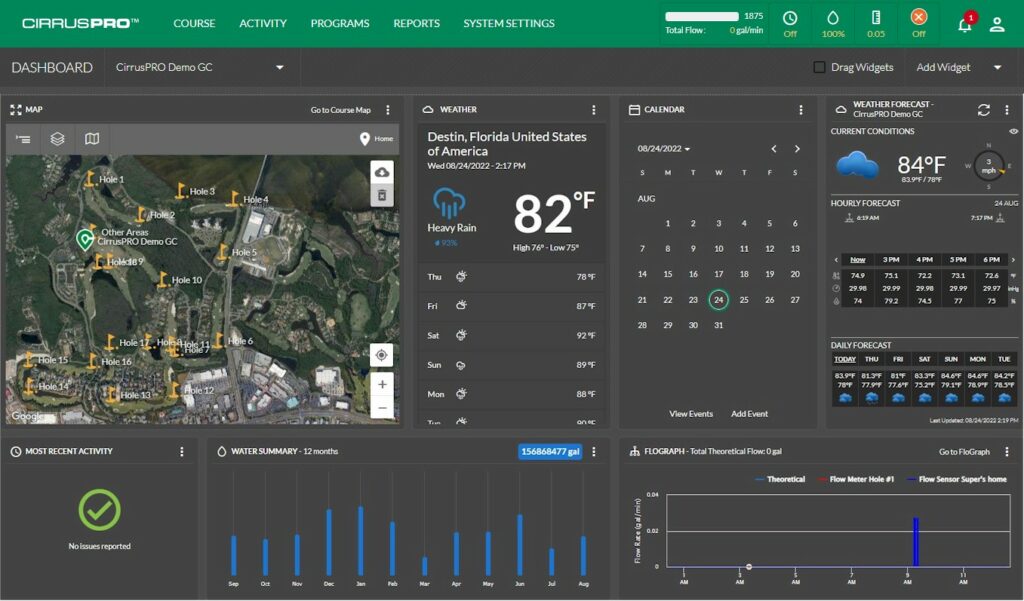IA’s Certified Irrigation Technician Exam
CITs are field technicians who install, maintain, and repair irrigation systems.
To become a CIT, you must:
- Register for the exam
- Pass the irrigation technician exam
- Comply with the Select Certified Code of Ethics from The Irrigation Association
- Remain in good standing. (Gain 20 CEU hours per two-year cycle)
Course Outline
Understanding basic irrigation principles (41-46%)
- Sprinkler type, nozzle type and spacing
- Evaluate coverage are to determine sprinkler type and spacing
- Assess spacing relative to sprinkler type and coverage area
- Assess existing nozzle selection
- Perform maintenance and adjustments
- Match head and nozzle being replaced
- Understand relative precipitation rates
- Swing joint assemblies
- Identify assembly components
- Determine appropriate swing joint type
- Determine appropriate swing joint installation
- Pipe fittings and connection procedures
- Select proper solvents for pipe type and primers
- Identify type of pipe fitting
- Determine connection procedures based on pipe and fitting type
- Perform connection procedures based on pipe and fitting type
- Equipment and tool usage
- Follow manufacturer’s instructions
- Select appropriate equipment and/or tools for the task
- Maintain equipment and tools
- Pumps
- Identify pump types, components and controls
- Understand pump flow and pressure
- Demonstrate understanding of pump safety
- Backflow functionality
- Identify backflow type, function and components
- Identify state and local requirements
- Plans and as-built documentation
- Read scale and legend
- Understand specifications
- Water meter usage
- Identify appropriate meter
- Understand meter readings
- Identify leak detector on meter
- Job safety
- Identify and use appropriate safety equipment
- Locate utilities
- Follow exaction safety procedures
- Follow confined space entry procedures
- Follow MSDS guidelines
- Startup and winterization procedures
- Identify leaks
- Identify all water supplies
- Demonstrate understanding of basic soil-plant-water relationships
Understanding electrical principles: (28-32%)
- Voltmeter operation
- Test amperage or watts
- Test for voltage, resistance, and continuity
- Understand voltmeter readings
- Controller electrical operation
- Demonstrate understanding of basic controller programming
- Identify components
- Perform diagnostics procedures
- Perform controller functions
- Perform reset procedures
- Perform basic controller ad component replacement
- Transformer operation
- Test incoming and outing voltage
- Match transformer properties for replacement
- Solenoid operation
- Test resistance and incoming voltage
- Identify manufacturer
- Identify manufacturer specifications
- Wiring types
- Determine wire size and type
- Determine appropriate burial depth
- Field wiring/wire tracking/valve locating
- Select appropriate equipment
- Perform equipment setup and operational procedures
- Perform splicing procedures
Understanding hydraulic principles: (26-27%)
- Sensors
- Demonstrate understanding of how sensors operate
- Identify sensors used
- Perform sensor maintenance and replacement
- Follow manufacturer’s operating procedures
- Valves
- Demonstrate understanding of how valves operate
- Identify valves
- Perform valve installation, maintenance, troubleshooting and repair
- Install appropriate valve enclosure
- Pressure testing
- Determine dynamic vs. static pressure
- Understand pressure gauge readings
- Understand manufacturer’s pressure requirements
- Flow testing
- Record flow meter readings
- Understand manufacturer’s flow requirements
- Drip mechanics
- Determine maximum tubing length
- Identify filtration and pressure regulation requirements
- Identify emission devices
- Perform maintenance procedures
- Determine appropriate component usage
- Read friction loss charts
Learning Objectives
Candidates should be able to:
- Cut and join pipe
- Understand the limitations of different piping systems.
- Understand basic hydraulics.
- Lay out and install.
- piping and water delivery components
- backflow prevention components
- mechanical, hydraulic and electrical irrigation controls
- as well as other irrigation system components.
- Troubleshoot and repair irrigation components and systems.
